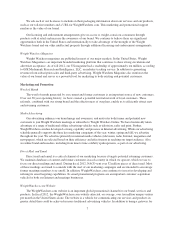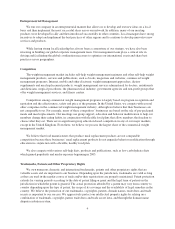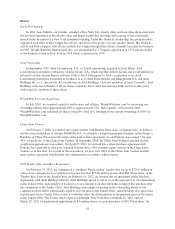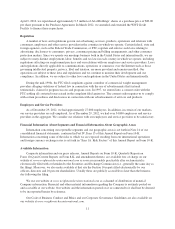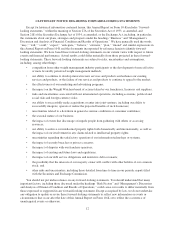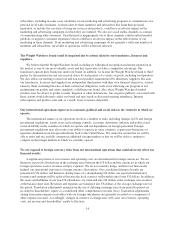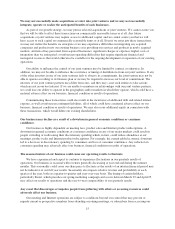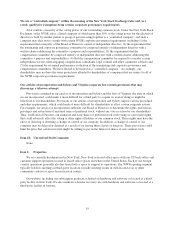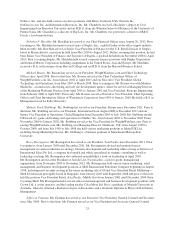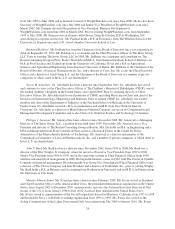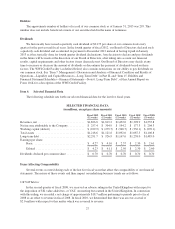WeightWatchers 2012 Annual Report Download - page 33
Download and view the complete annual report
Please find page 33 of the 2012 WeightWatchers annual report below. You can navigate through the pages in the report by either clicking on the pages listed below, or by using the keyword search tool below to find specific information within the annual report.Our reputation and the appeal of our services and product offerings may be harmed by security breaches
or privacy concerns.
Unauthorized users who penetrate our information security could misappropriate proprietary or customer
information or data or cause interruptions to the subscription offerings on our websites. As a result, it may
become necessary to expend significant additional amounts of capital and resources to protect against, or to
alleviate, problems caused by unauthorized users. These expenditures, however, may not prove to be a timely
remedy against unauthorized users who are able to penetrate our information security. In addition to purposeful
security breaches, the inadvertent transmission of computer viruses could adversely affect our computer systems
and, in turn, harm our business.
Most states require that customers be notified if a security breach results in the disclosure of their personal
financial account or other information. Additional states and governmental entities are considering such “notice”
laws. In addition, other public disclosure laws may require that material security breaches be reported. If we
experience a security breach and such notice or public disclosure is required in the future, our reputation and our
business may be harmed.
In the ordinary course of our business, we collect and utilize proprietary and customer information and data.
Privacy concerns among prospective and existing customers regarding our use of such information or data
collected on our websites or through our services and products, such as weight management information,
financial data, email addresses and home addresses, could keep them from using our websites or purchasing our
services or products. We currently face certain legal obligations regarding the manner in which we treat such
information and data. Businesses have been criticized by privacy groups and governmental bodies for their use
and handling of such information and data. Industry-wide events or events with respect to our websites, including
misappropriation of third-party information, security breaches or changes in industry standards or regulations, or
increased enforcement of existing or new laws, could have an adverse effect on our business.
Disputes with our franchise operators could divert management’s attention from their ordinary
responsibilities.
In the past, we have had disputes with our franchisees regarding operations and other contractual issues. For
example, we have had disputes with some of our franchisees regarding the interpretation of franchisee rights as
they relate to the Internet and mail-order products. Any future disputes could divert the attention of management
from their ordinary responsibilities.
Our businesses are subject to legislative and regulatory restrictions.
A number of laws and regulations govern our advertising, services, products, operations and relations with
consumers, licensees, franchisees, employees and other service providers, and government authorities in the
countries in which we operate.
Certain federal, state and foreign agencies, such as the FTC, regulate and enforce such laws relating to
advertising, disclosures to consumers, privacy, consumer pricing and billing arrangements, and other consumer
protection matters. A determination by a federal, state or foreign agency, or a court in connection with a
governmental enforcement action or private litigation, that any of our practices do not meet existing or new laws
or regulations could result in liability, adverse publicity, and restrictions of our business operations. For example,
during the mid-1990s, the FTC filed complaints against a number of commercial weight management providers
alleging violations of federal law in connection with the use of advertisements that featured testimonials, claims
for program success and program costs. In 1997, we entered into a consent order with the FTC settling all
contested issues raised in the complaint filed against us. The consent order requires us to comply with certain
procedures and disclosures in connection with our advertisements of products and services.
Since we operate our meetings business both in the United States and internationally, we are subject to
many distinct employment, labor, benefits and tax laws in each country in which we operate, including
17


